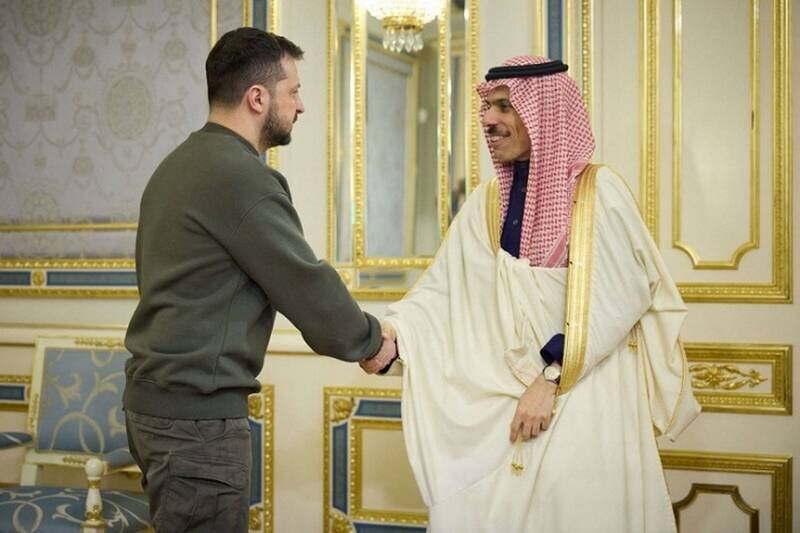Jeddah summit: U.S. effort for a dignified end to Ukraine war?

TEHRAN- On July 27th, Jake Sullivan, the national security advisor to President Joe Biden, visited Saudi Arabia for talks with Saudi officials.
Although some Western media outlets interpreted the negotiations as an attempt to foster a relationship between Israel and Saudi Arabia, the evidence suggests that the trip's primary purpose was to arrange an upcoming meeting to resolve the Ukraine-Russia war. The meeting is scheduled for August 5th and 6th in Jeddah, with senior officials from 30 countries expected to attend.
The US appears content with the war’s conclusion in Ukraine. However, they are cautious about how the outcome is perceived globally, as they do not want the West to be viewed as the defeated party. The U.S. is taking indirect measures and offering minor concessions to Russia to achieve a ceasefire in the Ukraine-Russia war. In order for the U.S.-proposed ceasefire terms to be accepted by Russia, specific actions must be taken. The White House is closely observing these actions to ensure a satisfactory outcome.
To encourage Russia to participate in negotiations, the U.S. has implemented a variety of political, psychological, and military tactics. These include the use of prohibited cluster munitions, the delivery of previously denied long-range missiles to Ukraine, and the targeting of areas deep within Russian territory. Additionally, kamikaze drones attacking Moscow have been used to persuade the Kremlin to agree to a ceasefire.
When you compare the recent movements of the U.S. in Syria with their military formation, you'll notice they're all headed in the same direction and don't seem to have any other objective than putting psychological pressure on Russia. It's evident that due to the upcoming 2024 presidential elections, the U.S. cannot engage in a direct war with Russia.
Even the F16 Fighting Falcons that the U.S. had previously announced to send to the Persian Gulf to protect ships against Iran's actions is nothing more than a lie. It probably wanted to indirectly warn the Russian side that the aircraft will be sent to support its military in Syria. But at the same time, the U.S. put its blame on the Arab states of the Persian Gulf by saying that the U.S. is still committed to ensuring security in the region. However, the Arab states have understood that the U.S. army has done nothing in the region and it is just a fake hegemon.
What is the reason for selecting Saudi Arabia as the host?
Saudi Arabia, being a leader among the Arab states, could earn international recognition and success by hosting such an important meeting and serving as a mediator.
In addition, this meeting will prevent China, a rival of the U.S., from playing a significant role as a global actor in an important event. It is worth noting that China achieved significant credit by mediating an agreement between Saudi Arabia and Iran.
Thirdly, the U.S. is willing to appease Saudi Arabia, a significant energy supplier worldwide, which has signaled to the East after its animosity with the United States.
Another point to consider is the positive relationship between Arab states and Russia. This may decrease the likelihood of Russian opposition to decisions made during the meeting. It's worth noting that both the United States and Russia respect Saudi Arabia.
Additionally, several attendees of the meeting will likely be from non-aligned nations that didn't participate in the Western sanctions and maintain ties with Russia. If a joint statement is produced, Russia may be at odds with these countries that stood by it during the sanctions. This could pose a significant challenge to Russia.
It appears that the U.S. is trying to find a way out of the predicament it has created while still maintaining its hegemony, continuing the war in Ukraine, and the billions of dollars that the U.S. spent in Ukraine still failed to achieve the desired outcome.
The current situation does not put pressure on Russia but instead on the U.S. and its allies. Europe is experiencing significant strain and may start to distance itself from U.S. policies, as it has not been cooperative in deploying weapons to Ukraine as the White House expected; Although the United States did not suffer as much as Europe, it has so far spent more than $300 billion on an inconclusive war.
In contrast, Ukraine suffered destruction and did not join the North Atlantic Treaty Organization (NATO). Over 20% of its territory was occupied, and half its population was displaced. Additionally, many Ukrainian men lost their lives. Despite these challenges, Russia was able to maintain its security and economy. Furthermore, they were able to neutralize the impact of sanctions to a significant extent.
It could be argued that Western countries have suffered the most in the ongoing Russia-Ukraine war, and if the war persists, it's unlikely to yield favorable outcomes for the United States. So, it's reasonable for the U.S. to take a firm stance to end the conflict.
The Russians can come out on top in the upcoming Jeddah meeting if they remain alert and avoid falling for U.S. tricks, even though they also desire an end to the war. The U.S. cannot engage in direct warfare despite their assertions, and their deployment of troops to Syria is merely for show. Nonetheless, it remains uncertain whether the Russia-Ukraine conflict will come to a swift conclusion.
